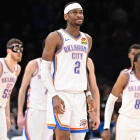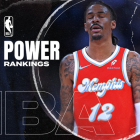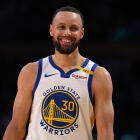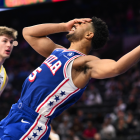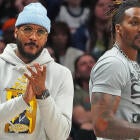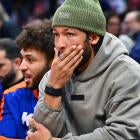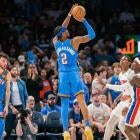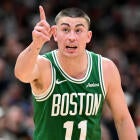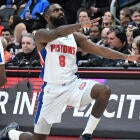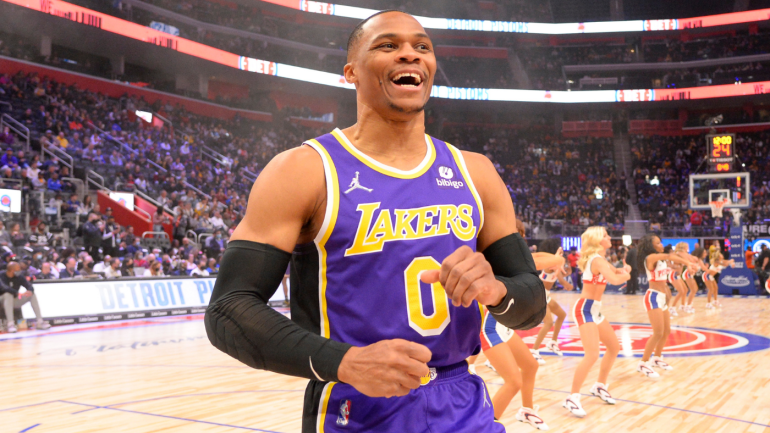
You've probably seen the clip by now. The Los Angeles Lakers, after trailing by as many as 23 points in their Christmas showdown with the depleted Brooklyn Nets, had managed to cut the deficit to only two with just under two minutes remaining. They'd held Brooklyn to just 10 points in the fourth quarter thus far, but on the most important possession of the game to that point, Russell Westbrook completely lost track of Patty Mills, one of the most dangerous shooters in the NBA midway through a 34-point explosion, who proceeded to drain the most important 3-pointer of the night.
It's a pretty fitting encapsulation of Westbrook's first 36 games as a Laker. The breakdown wasn't entirely his fault. Malik Monk botches the initial switch. The game doesn't end on this possession, either. The Lakers would go on to tie it at 115.
But ultimately, what we have here is one of the most important plays of the game going against Westbrook's team at least in part because of a mistake Westbrook makes fairly frequently. The best explanation for this defensive lapse was that he was playing the short-roll pass to Bruce Brown. The Lakers had three other bodies in the paint. A fourth was overkill if the price was a wide-open Mills, especially since Westbrook wasn't particularly well-angled for a steal or strip. His freelancing gave Brooklyn its ideal shot. It was, at best, a high-risk, low-reward decision.
That's one way people described the Westbrook trade itself. The Lakers sacrificed the bones of their top-ranked defense and nearly all of their matching salary to trade for a player whose skill set overlaps with LeBron James'. They've paid a price for that. The Lakers were 23-11 through 34 games a season ago. They're 16-18 now, and their net rating has fallen from fifth to 23rd. That isn't to say he's entirely to blame here. He's even taken baby steps toward fitting in with his more accomplished teammate. He's launching his fewest 3-pointers since the 2011-12 season, and he's devoting more than half of those attempts to catch-and-shoot looks, which he's typically made at a slightly higher clip than pull-ups. His usage rate is down to only 27.9 percent, the lowest figure he's posted since his second NBA season, and he's cut his mid-range attempts per game nearly in half from 6.1 last season to 3.1 this season.
These are notable but minor changes. The Lakers are still devoting nearly seven shots per game to ineffective Westbrook jumpers, and 27.9 is still a fairly high usage rate for a guard that struggles to make shots. He's turning the ball over as frequently as ever and he remains a paradoxically poor defender, the sort of player that prides himself on effort yet expends it inconsistently when his team isn't the one that's trying to score. The promising ball-screens he was setting for James earlier in the season have mostly faded out of the offense, and while he's cutting slightly more than usual, nobody would mistake his growth for the progress Dwyane Wade made in the arena when he was forced to adjust to LeBron's presence. He is… in other words… Russell Westbrook.
That's what makes blaming him for all of this team's woes so unfair. He is essentially a slightly older version of the player he's been for his entire career. If the Lakers expected wholesale stylistic changes just because he was joining a contender, well, they weren't watching him closely enough in Oklahoma City or Houston. The Lakers, largely due to his $44 million salary, did him a disservice by cheaping out on Alex Caruso and depriving him of a proper defensive backcourt-mate. They unwisely loaded up on redundant ball-handlers rather than the shooters and defenders Westbrook needed to thrive alongside James. It's not his fault that the Lakers don't particularly need what he brings to the table and desperately lack what he doesn't.
But Westbrook hasn't exactly lived up to his end of the bargain either. The theoretical benefit of acquiring him was that it would allow the Lakers to limit LeBron's minutes and survive the ones he missed. Well, 37-year-old LeBron is playing almost 37 minutes per night. When Westbrook plays without him, the Lakers are getting outscored by 7.4 points per 100 possessions. He isn't easing anyone's burden and he's not keeping the Lakers afloat in their most vulnerable moments. Westbrook has a history of improving significantly as seasons progress, but it's worth asking how meaningful that improvement would even be to this Lakers team. The No. 27 ranked Laker offense could certainly use more transition scoring and better efficiency at the rim from Westbrook, but what can he do to encourage more off-ball movement in teammates? The Lakers rank 18th in 3-point percentage and 22nd in attempts. There's not much Westbrook himself could be doing to improve those rankings when he's not a threat from behind the arc himself. Better defensive effort would be appreciated, but size and schematic reliability are weaknesses he'll seemingly never grow out of.
All of these factors have come together to make the Lakers the most disappointing team in the NBA, and it's not particularly surprising. The Lakers put Westbrook in a poor position to succeed and he, in turn, created artificial roster-building and on-court restraints that were visible to pretty much everyone outside of the organization from the moment the trade was announced. With Anthony Davis still injured and one of the NBA's hardest remaining schedules, the playoffs are no longer even a certainty. Even if the Lakers never dreamed it could get this bad, it's now a truth they can no longer avoid. Almost half of the season is gone. This experiment isn't working. The time to seriously explore alternatives is now.
The problem they're going to face is that there aren't that many available. Most players in Westbrook's salary range are significantly more valuable. Even if the Lakers are willing to trade him for Ben Simmons, for example, it just seems enormously unlikely that Philadelphia would consider such a proposal. Go down the list of very highly-paid players that aren't superstars. Would Dallas send Kristaps Porzingis out in a Westbrook trade? Probably not. Would Boston delve deeper into the tax in an Al Horford-based swap? Highly doubtful. Cleveland has a good thing going. Why would the Cavs reunite Kevin Love with James just to take on $47 million in Westbrook salary for next season when Darius Garland is already better than him? There just aren't many feasible trades out there. Few teams want inefficient lead ball-handlers like Westbrook. Fewer have salaries that can feasibly be traded for him. The only one that makes immediate sense is a player he's already been traded for.
John Wall's contract is identical to Westbrook's. He holds no on-court value to the Houston Rockets as their youth movement has kept him off of the floor entirely. He is represented by Rich Paul, the leader of Klutch Sports that also serves as the agent for LeBron James and Anthony Davis. With all of this in mind, might some sort of Westbrook-for-Wall be worthwhile to the Lakers?
Well… the immediate answer is probably not. Wall comes with many of the same limitations as Westbrook. He's never been a particularly strong shooter, and with his 31st birthday and multiple significant injuries in the rearview mirror, it isn't clear how much he has left in the tank defensively, either.
But Wall has at least been an effective defender in the past. He earned All-Defensive honors in 2015, and while he's declined since then, the Lakers could at least trust him to play hard and stick to the script on that end of the floor. Even without the speed that once made him special, there's something to be said for reliability on a team with so many incapable defenders. A deeper dive into his shooting numbers paints a slightly more optimistic picture as well. Wall may be only a 32.3 percent career 3-point shooter, but he's hovered around 38 percent on wide-open and catch-and-shoot 3's since the NBA started tracking those looks during the 2013-14 season. Those are the sort of shots the Lakers need their non-LeBron perimeter players to make more than the low-percentage pull-ups that primary ball-handlers like Wall and Westbrook are often forced into.
For as much as Wall has seemingly lost physically, his raw numbers from last season are far closer to Westbrook's now than the Lakers should be comfortable with. Wall shooting 55.4 percent in the restricted area last season was borderline disastrous by his standards… but Westbrook is at just 58 percent this season despite significantly more surrounding talent. Wall ranked in the 21st percentile in terms of efficiency as a transition scorer last season, according to Synergy Sports, but Westbrook ranks in just the 18th percentile this season. Both were roughly average in pick-and-roll and spot-up situations. Wall scored more points (20.6 to 19.6) but did so slightly less efficiently (48.5 effective field goal percentage for Westbrook compared to 45.8 for Wall). Westbrook's superior rebounding is the primary statistical difference here. If Wall is declining, so is Westbrook.
That gets to the crux of the issue here. Wall probably can't save the Lakers for many of the same reasons Westbrook isn't fitting in with them. This roster, with 10 minimum-salary players, is so fundamentally flawed that no sub-All-Star-caliber player like Wall or Westbrook could singlehandedly fix it. So why would the Lakers explore such a trade? Because this mix isn't working and trading one player, even a $44 million player, is more realistic than trading 10 of them. The Lakers can't remake their entire supporting cast in the middle of the season. They can't go back in time and bring Caruso back or better allocate their resources in free agency. This is the team that they have. They might be able to change it but they can't overhaul it entirely. Even if a Wall trade doesn't fix everything, it offers theoretical benefits that could potentially revitalize a team that is in desperate need of revitalization. It might help, but who cares if it doesn't? The current team isn't working either. If there's a better deal out there, the Lakers should take it. In the likely event that there isn't, doing something is still better than nothing.
That brings us to the matter of cost. The Rockets have no incentive to help the Lakers. They also have far more leverage here. While they've vigorously shopped Wall, they've never done so from a position of desperation. They certainly appear comfortable keeping Wall benched until his contract expires. They have no intention of competing in that timeframe anyway. The Lakers do. They can't just wait out Westbrook's contract in part because James is about to turn 37 and in part because James can become a free agent in 2023, when Westbrook's deal expires. Their window to win is right now, and the Rockets know that. If the Lakers prefer Wall, the Rockets can bleed them dry even if they're just trading one player they have no intention of using for another.
That makes building an exact deal framework difficult. The Lakers have four of their own second-round picks and three external second-rounders to offer in a deal, and they'd surely prefer to offer those. The Rockets, who have taken a very public long-view of roster-building, would surely ask for the lone first-round pick that the Lakers can legally trade at the moment. That pick would come in either 2027 or 2028. The Lakers would likely balk at that request. There's no telling which side would blink first, and it would be an epic staring contest. The Lakers, knowing the Rockets have no other Wall offers on the table, would try to hold firm knowing that they would essentially be offering Houston free draft picks. The Rockets, in turn, would know that the Lakers have no alternate Westbrook deals to pivot into and could therefore play hardball knowing that they have no immediate need to make a deal.
That game of chicken is just one of the many obstacles to a deal here. In all likelihood, even if the Lakers have explored Westbrook deals, they're probably going to end up keeping him through the end of the season at least. They just shouldn't be surprised if doing so continues to produce the lackluster results they've received all season.
![[object Object] Logo](https://sportshub.cbsistatic.com/i/2020/04/22/e9ceb731-8b3f-4c60-98fe-090ab66a2997/screen-shot-2020-04-22-at-11-04-56-am.png)










